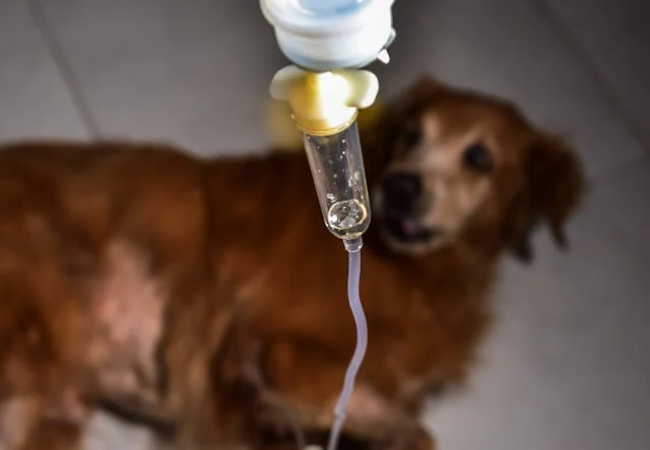Blood Transfusion Reactions in Dogs: Vet-Approved Causes, Symptoms & Treatments (2025 Guide) 🩺🐶🩸

In this article
Blood Transfusion Reactions in Dogs: Vet-Approved Causes, Symptoms & Treatments (2025 Guide) 🩺🐶🩸
By Dr. Duncan Houston BVSc
Blood transfusions are often life-saving procedures for dogs facing severe anemia, trauma, or surgical blood loss. However, like any medical intervention, they carry potential risks. Understanding blood transfusion reactions is crucial for pet owners to ensure timely recognition and treatment. This comprehensive guide delves into the causes, symptoms, and management of blood transfusion reactions in dogs.
🧬 What Are Blood Transfusion Reactions?
A blood transfusion reaction occurs when a dog's body responds adversely to transfused blood or its components. Reactions can be categorized as:
- Immune-mediated: The recipient's immune system attacks donor blood cells.
- Non-immune-mediated: Reactions due to factors like volume overload or contaminated blood.
Reactions can be acute (within minutes to hours) or delayed (days to weeks post-transfusion).
⚠️ Symptoms of Blood Transfusion Reactions
Recognizing symptoms early is vital. Signs may include:
- 🌡️ Fever: Elevated body temperature.
- 🤮 Vomiting or Diarrhea: Gastrointestinal distress.
- 😴 Lethargy: Unusual tiredness or weakness.
- 💙 Pale or Yellow Gums: Indicating anemia or jaundice.
- 💓 Increased Heart Rate: Tachycardia.
- 🛌 Collapse or Shock: Severe reactions can lead to collapse.
- 🩸 Hematuria: Blood in urine.
- 🐾 Hives or Itching: Allergic reactions.
If any of these symptoms occur during or after a transfusion, seek veterinary care immediately.
🐾 Causes and Risk Factors
Several factors can lead to transfusion reactions:
- 🧬 Blood Type Mismatch: Dogs have multiple blood types; mismatches can cause immune reactions.
- 🧪 Contaminated Blood: Bacterial contamination can lead to septicemia.
- 💉 Rapid Transfusion: Administering blood too quickly can cause volume overload.
- ❄️ Cold Blood Products: Transfusing cold blood can lead to hypothermia, especially in small dogs.
- 🧫 Stored Blood Issues: Improper storage can damage red blood cells.
Previous transfusions increase the risk of reactions due to sensitization.
🩺 Diagnosing Blood Transfusion Reactions
Diagnosis involves:
- 🩸 Blood Tests: Assessing for hemolysis or immune responses.
- 🧪 Urinalysis: Checking for hemoglobinuria.
- 🖼️ Imaging: Identifying complications like fluid overload.
- 🔬 Crossmatching: Ensuring donor-recipient compatibility.
Monitoring during and after transfusion is essential for early detection.
💊 Treatment Options
Immediate steps include:
- ⛔ Stop Transfusion: Cease the transfusion at the first sign of a reaction.
- 💧 Supportive Care: Administer IV fluids to maintain blood pressure.
- 💊 Medications: Depending on the reaction type:
- Antihistamines for allergic reactions.
- Corticosteroids for immune-mediated reactions.
- Antibiotics if infection is suspected.
- Diuretics for fluid overload.
Close monitoring and follow-up tests are crucial to assess recovery.
🛡️ Preventing Blood Transfusion Reactions
Prevention strategies include:
- 🧬 Blood Typing and Crossmatching: Ensuring compatibility before transfusion.
- 🏥 Using Screened Donors: Selecting donors free from infectious diseases.
- 📦 Proper Storage: Maintaining appropriate storage conditions for blood products.
- 📈 Controlled Transfusion Rates: Administering blood at safe speeds.
- 🩺 Monitoring: Observing vital signs during and after transfusion.
These measures significantly reduce the risk of adverse reactions.
📱 Support and Resources
If you suspect your dog is experiencing a transfusion reaction, seek veterinary care immediately. For additional support:
- Ask A Vet: Access professional veterinary advice through the Ask A Vet platform.
- Download the Ask A Vet App: For quick access to veterinary support, download the Ask A Vet app.
Early diagnosis and appropriate treatment can significantly improve your dog's quality of life.
🐾 For more expert advice and pet care tips, visit AskAVet.com.






